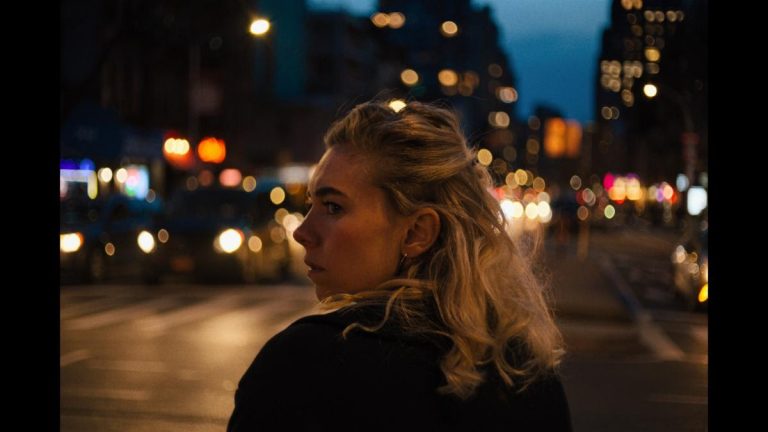
A film’s length should ultimately count as nothing. Whether it’s the typical 90 or 120 minute run time; if a filmmaker does their job right the running time is arbitrary. With that being said, when I saw the running time for Italian Studies was under 90 minutes I was overjoyed. To me, this meant there should be no unnecessary padding to the story. No one went in and said, “you can’t release this unless it is of an acceptable length.” Unfortunately, like an unwanted Friday afterschool language course, Italian Studies moves at a snails pace.
While in New York City, Alina Reynolds (Vanessa Kirby) looses her memory while taking her dog for a walk. Without an idea of who she is or what she is meant to be doing, Alina searches the city for a young girl. She doesn’t know why she needs to find this person, and she doesn’t know who she is…but she needs to find her. In her search, she befriends another teen by the name of Simon and begins to hang out with Simon’s group of friends. Will her memory come back? Is the girl she’s looking for part of Simon’s crew? In the city that never sleeps answers must be around the next corner, right?
Italian Studies is trying to be two different movies. On one hand, it is attempting to be the subtle memory loss mystery it bills itself as. On the other, a clever experiment being perpetuated on the streets of Manhattan. The camera acts almost as one of the million New York faces stood on the street, watching the lives of others over a sea of heads and shopping bags. It feels like the filmmakers went out (this was pre-Covid) and sent Vanessa Kirby out on the street in hopes she would encourage unscripted confrontations with others. Instead, people seemed to be more focused on looking at the camera than Kirby. I’m hard pressed to feel any interaction between Kirby and any other person on the street was not already set-up in some manner.
Unlike Scarlett Johanssan who had very real, and highly unscripted run-ins with locals in Scotland for the filming of Under the Skin, New Yorkers were in typical form by not caring. Worried more about some camera lens facing in their direction when they turned the corner and less about the random person on the street. As a New Yorker, if I’m walking down the street and I see someone who looks like they want to be noticed, the last thing I’m going to do is pay them any attention. What we’re left with in the finished product is pseudo-voyeurism which doesn’t fully serve the grand scheme.
Memory is a funny thing and it’s great fodder for good stories. But paying homage to both sides of foggy memory is where Italian Studies gains points. For the majority of its brief running time, the film is a love letter to adolescence. It revels in the creative and seemingly limitless imagination of its young characters and Alina’s need to somehow capture their essence. Though, in the end, that fleeting naivete is a chapter that is maybe best not revisited. There is a strange longing to both re-live and forget these experiences in the same breath. That idea alone is highly fascinating.
There needs to also be side note made about one piece of music in the film. At one point, Alina is reading over a short story that tells about a group of teens out for a night of drinking and debauchery. While they’re at a club presenting open mic music acts, one singer/songwriter grabs the main character’s attention as she’s transfixed by the tune. Typically, whatever song/visual/piece of art a filmmaker presents in these situations doesn’t live up to the aura it is portrayed with. This time though, they hit the nail in the head. I was personally transfixed by this song and performance as well, and will be hunting it down for my current playlist.
Back to this brief run time though. Because, that is the major sticking point for me personally. Italian Studies does suffer from the meat of its visuals. People watching is what you do to kill time while waiting for your cross-town bus to keep your mind off the clock. It’s not meant to make you feel like you’ve been in your seat for longer than you have. This is a film that would have worked better as a short. Cut out the fat and make it a lean gut punch to nostalgia. It won’t make you tear out your hair waiting for a resolution, but it will get those feet tapping in anxious anticipation of an ending.
Final Grade: B-

